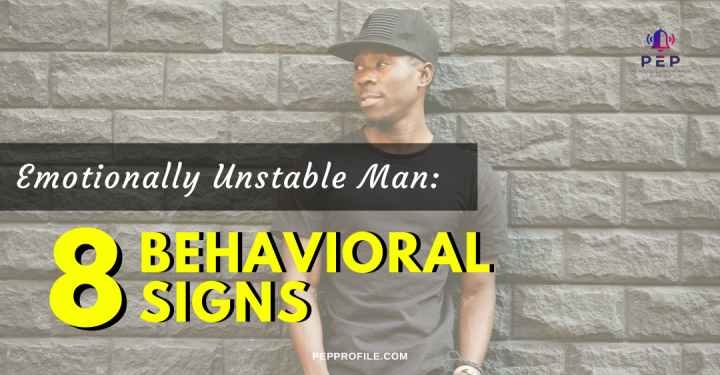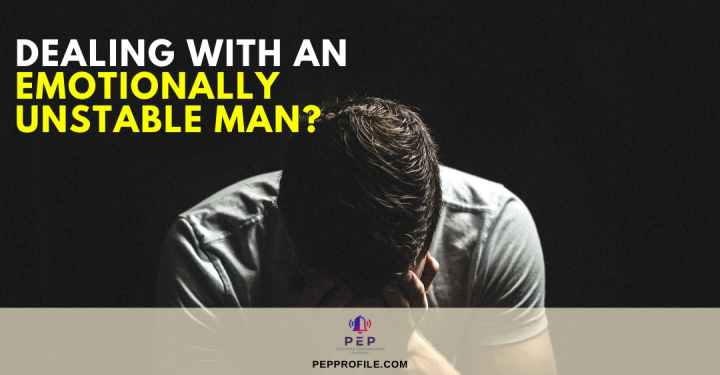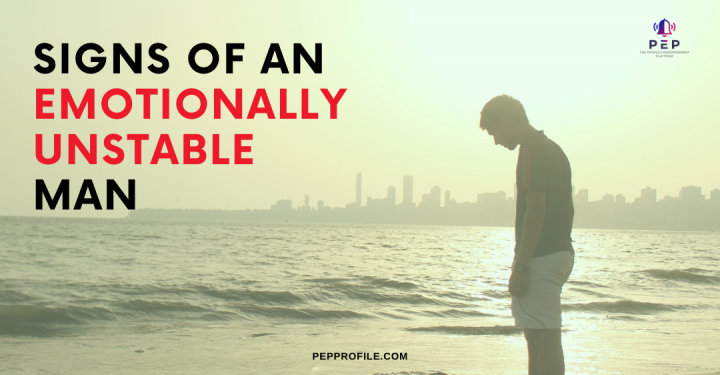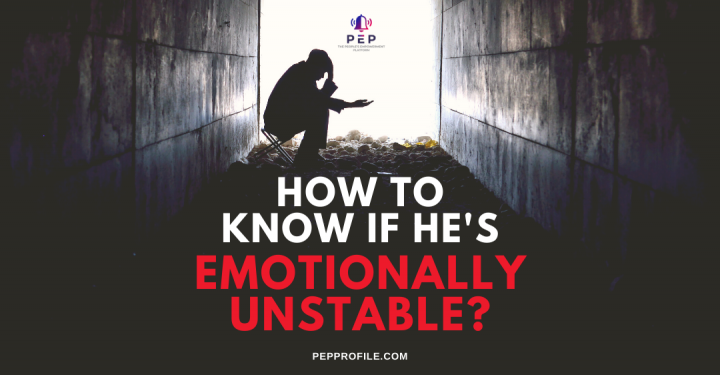Member Sign In
Login with email and password
No account yet? Register Now

Today I’m going to talk about the eight behavioral signs that suggest you may be dealing with an emotionally unstable man.
This discussion will walk you through the science of emotional instability and some strategies that psychologists recommend to help get your emotions back under control.
Now, a disclaimer to start. Not everyone who experiences a wide range of emotions is emotionally unstable. Likewise, when someone is going through a challenging time in their life, such as the loss of a loved one or a period of intense change, experiencing some emotional instability is to be expected.
However, if you are experiencing extreme fluctuations in mood, self-image and behavior that extend beyond a few weeks, you might be dealing with something more serious, such as a mood or personality disorder. In this situation, you should consider reaching out to a professional, such as your GP.
Alright, now that we’ve covered that, let’s dive in!
The first sign of an emotionally unstable man is, of course, rapid mood swings. Now, mood swings are normal when they come in response to day-to-day events. For example, you might start your day feeling generally energetic and positive, but then an incident at work, such as an unpleasant interaction with a colleague, brings you down and leaves you feeling glum.
This is normal. However, when you find yourself slipping into a bad mood when there are no triggers in the environment or if the emotional reactions you’re having are too severe relative to the situation, you might be on the rollercoaster of emotional instability.
The second behavioral pattern of the emotionally unstable man is emotional outbursts. We know from research that displays of negative emotion may look very different between men and women due to social conditioning.
While studies suggest that women have been conditioned such that they are more likely to display sadness or anxiety, men, on the other hand, are more likely to show anger or contempt. In an emotional outburst situation, this may translate to behaviors such as yelling, road rage or damage of property.

Third, we have neediness in relationships. This may manifest as attempts to dominate the time and attention of friends or partners, and jealousy at seeing those close to them enjoy the company of others. Often, this clinginess may stem from experiences of abandonment in childhood, such as parental neglect.
On the topic of Borderline Personality Disorder — which is the clinical diagnosis for extreme emotional instability — Psychologist Carol Berman for the Huffington Post writes:
“The person may act overly needy when their support system is removed, even temporarily, such as when a close friend goes on vacation.”
This may create a frustrating situation for friends and partners of the emotionally unstable man as his neediness paradoxically pushes those closest to him away.
The next behavioral pattern to watch out for is if a man tries to play the victim. The emotionally unstable man will often claim that how he expresses his emotions is beyond his control. He may try to position himself as being the victim of these emotions and argue that it’s not his fault when they drive him to engage in counterproductive behavior.
While it’s true that we can’t help how we feel, our emotions don’t excuse our actions. Most of us understand this intuitively — it’s why we still treat others with respect even when we’re in a bad mood.
But the emotionally unstable man may be reluctant to take ownership of his actions in this way, preferring instead to blame bad behavior on his mood - and sometimes other people. “So and so pissed me off.” No. YOU allowed “so and so” to piss you off.
The fifth sign of an emotionally unstable man is lack of empathy. To the emotionally unstable man, his woes are at the center of not only his universe but everyone else’s. So, when someone comes onto the scene with a problem of their own, the fear of no longer being the center of attention may drive the emotionally unstable man to downplay others’ issues and engage in one-upmanship.
For example, if you express that you are stressed, the emotionally unstable man will let you know that you don’t even know the meaning of the word ‘stress’ and proceed to list his many looming deadlines and worries instead of responding to your concerns with empathy.
While making my empathy we found a study that explained when two people share a negative experience, their ability to empathize with one another is on par. However, when those same people were given contrasting experiences, for instance a positive experience for one and a negative experience for the other, their ability to empathize was severely compromised.
The person with the positive experience would down play the negative effects of the person with the negative experience. The person who had the negative experience would downplay the positive effects of the other person’s experience.
When it boiled down to it, it appeared that our emotional state has a heavy influence on how we interpret the experiences of other. Seems to be human more so than a trait of the emotionally unstable, but I’ll keep it in.

Number six is impulsive decision making. As I mentioned, the emotionally unstable man feels that he’s at the whim of his emotions. This can drive him to make rash decisions based on how he is feeling in a given moment, rather than based on logic and good judgment.
For example, one study in the Journal of Social and Clinical Psychology found that high levels of emotionality were significantly related to behaviors like impulse buying and reckless driving.
The seventh pattern of the emotionally unstable man is substance abuse or addiction. For those struggling with emotional instability, drugs, alcohol, gambling or other addictive behaviors may temporarily serve to soothe or numb the emotions holding the person hostage.
Of course, in the long term, addictions and substance abuse can have dire consequences for our relationships, our finances and our health. Unsurprisingly, researchers have found a clear link between intense emotionality in the form of Borderline Personality Disorder and substance abuse, with some estimating that up to 50% of people struggling with the disorder also struggle with substance abuse.
Lastly, the emotionally unstable man’s close relationships are likely to be on and off and full of drama. Not just intimate relationships. Any close relationship. Most of the behavioral patterns I’ve mentioned will inevitably present challenges to the partner of the unstable man.
Neediness, mood swings and an inability to empathize are factors that can strain any relationship. The partner of the emotionally unstable man may also feel like they have to walk on eggshells to avoid triggering an outburst, which may lead to extreme arguments and eventually breakups.
Additionally, the impulsivity of the emotionally unstable man may drive him to call relationships off or spontaneously declare that he needs some time alone, again resulting in unnecessary drama.
Emotions are a day-to-day part of life, but hopefully, these eight signs I’ve discussed will help you recognize when you may be dealing with an extreme case.
I chose this topic because looking back on my life I, especially my younger years I could see myself carryout some of these traits.
Any turn of events or an upset can trigger a person on rare occasions. But when any of these eight traits become patterns you’re probably dealing with an emotionally unstable man.
Now, let me give you three strategies recommended by psychologists that you or someone you may be concerned about can start using today to help get your emotions under control.
First, try practicing mindfulness. Professor and leading mindfulness expert Jon Kabat-Zinn defines mindfulness as “the awareness that emerges through paying attention on purpose, in the present moment, and non-judgmentally to the unfolding of experience moment by moment.”
When you practice non-judgmental awareness through mindfulness, you practice focusing your attention on the present moment and letting your thoughts and emotions flow without judging them as either good or bad.
This helps to create separation between you and your feelings, meaning that emotions will have less control over you and your behavior.
Secondly, ensure you maintain healthy routines. When we don’t look after ourselves physically, our minds and emotions pay the price. To help, try to maintain a healthy diet and get at least thirty minutes of moderate physical exercise three to five times a week.
Be sure you’re getting your recommended eight hours of sleep and be wary of how stimulants like coffee affect your mood.
For me, if I am sleep deprived, my patience is nonexistent. For my lady, it’s food. If she’s hangry, she’s mad at everyone.
I grew up in households and communities where most communication was done through emotional outbursts. Where hasty and irrational decision making was the norm. It compromises our communities and the mental stability of our children.

I’m telling you from experience the long term effects of these behaviors is far greater than someone giving you the silent treatment for a couple of hours. It will not only cost you meaningful relationships and dry out your well of opportunity. It will take a physical toll and sometimes result in illness.
So when in doubt, speak to a professional. As I mentioned at the beginning, sometimes emotional instability can be a sign of a more serious underlying problem.
If you suspect this might be true for you or someone you care about, consider a basic health check as there may be a physiological or hormonal explanation for what you’re experiencing. Alternatively, your doctor may refer you to a psychological professional for further assessment.
So, remember, creating mental separation between you and your emotions is key to ensuring they don’t rule over your actions and upset those you care about.
If you yourself are struggling, consider starting a conversation with your partner or those who know you best to gain an outside perspective and understand how your emotions may be affecting others. And most importantly, never be afraid to reach out for help when you need it.
References:
Gender and emotion in context: https://pdfs.semanticscholar.org/504d/b5d29a64cc09f000b19315187c09948f831d.pdf
9 tips on how to recognize someone with borderline personality disorder:
https://www.huffpost.com/entry/9-tips-on-how-to-recogniz_b_5224432
Neuroticism as a risk factor for behavioral dysregulation: A mindfulness-mediation perspective:
https://guilfordjournals.com/doi/pdf/10.1521/jscp.2010.29.3.301
Borderline personality disorder and substance use disorders: an updated review:
https://www.ncbi.nlm.nih.gov/pmc/articles/PMC6145127/
Mindfulness?based interventions in context: past, present, and future:
https://onlinelibrary.wiley.com/doi/full/10.1093/clipsy.bpg016
Emotional instability: Description, Causes and Risk Factors:
Login with a social network